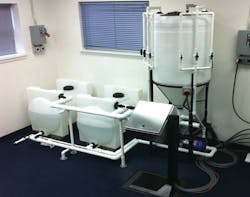Promoting news about engineering and technical training to help ensure the continued development of the automation profession has long been an important part of our coverage at Automation World. As a result, I regularly receive updates on developments related automation and engineering education activities.
Most recently, I learned about two new stories that both have a connection to Mitsubishi Electric. The first story is about Process and Data Automation (PDA), an industrial controls and integration company based in Erie, Pa., which sponsors the yearlong senior design project for students at The Behrend College’s School of Engineering at Penn State Erie. In support of this program, PDA provides a project adviser, donates time, funds, space and equipment.
“Having an industrial sponsor on a senior design project adds to its importance and complexity,” says Eric Williams, controls engineer at PDA, adding that many PDA engineers are Penn State Erie graduates. “Students know they are designing and working on a system that will likely be used and that makes completing the project far more rewarding.”
Williams recently worked as an adviser to students Monica Arriaga and Gian Alian as they added process sensors—including flow meters, pressure, and level sensors—to a simulator equipped with tanks, pumps, and associated plumbing that could be used in applications ranging from municipal water control to food production. They used the feedback to develop an inline blend system that controlled the speed of both pumps to achieve a constant proportion of product.
“We created our program almost from almost scratch,” says Arriaga, who now works as a communications engineer at Asco Power Technologies (an Emerson company) in North Carolina. “Most electrical engineering students don’t get the opportunity to work with real parts to learn how they connect to the PLC and then use them to program the system.”
Alian, who is now an instrumentation and controls engineer at Mitsubishi Electric Power Products Inc. in Warrendale, Pa., says, “Researching components and how they were used on the project allowed us to be proactive in understanding each component’s functionality. It was to our advantage to have all the system equipment available. This allowed us to perform tests easily with the supervision of our adviser.”
The other piece of news I received recently related to industry support of technical education came directly from Mitsubishi Electric and focused on the recent installation of a Takumi VC 0852 CNC machine with Mitsubishi Electric M70 controls at the Université du Québec à Trois-Rivières (University of Quebec at Three Rivers) to train a new generation of factory automation professionals in the university’s mechanical engineering department. The Takumi CNC machine incorporates Mitsubishi Electric CNC servo drives, NC drives and servo motors.
Mitsubishi Electric says the inclusion of the CNC machine in the university’s training curriculum is part of a longer-term strategy for the company. “Helping to provide a capable industrial workforce is part of our commitment to our customers,” said Tom Pleuger, Taiwan account manager, technical service & support, Mitsubishi Electric Automation Inc. “There’s a need to train a new generation of skilled metalworking personnel and Mitsubishi Electric Automation is a partner in that development. We’re looking forward to welcoming these students into the manufacturing workforce in a few years.”
To read about industry’s direct involvement in technical education by helping to shape the curriculum, read my earlier post about how BMW, Bosch, Michelin and numerous other manufacturers are working with TriCounty Technical College in South Carolina to develop the workforce they need.
Leaders relevant to this article:


